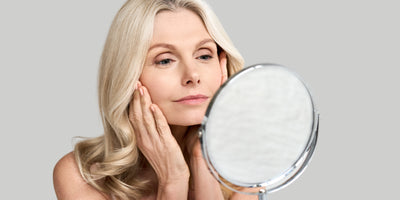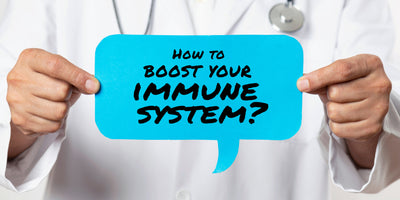
How Antioxidants Impact Fertility and Why Astaxanthin Is Essential for Men and Women
Fertility issues affect millions of couples worldwide, making conception difficult for both men and women. While lifestyle factors such as diet, stress, and environmental pollutants play a role, a growing body of research suggests that oxidative stress is a key contributor to fertility problems. This imbalance between free radicals and antioxidants in the body can lead to damage in sperm and egg cells, disrupting reproductive function. To combat this, increasing the intake of antioxidants can offer a natural and effective way to boost fertility. Among the various antioxidants, astaxanthin has emerged as a powerful player, offering unique benefits for men and women.
In this article, we'll explore how antioxidants, particularly astaxanthin, impact fertility. We’ll delve into the science behind oxidative stress, explain how astaxanthin works to support reproductive health, and why it is an essential addition to a fertility-focused lifestyle.
The Role of Oxidative Stress in Fertility: Understanding the Basics
Oxidative stress occurs when there's an imbalance between free radicals and antioxidants in the body. Free radicals are unstable molecules that can damage healthy cells, including reproductive cells like sperm and eggs. In reproductive health, this cellular damage can significantly reduce fertility by impairing the quality and function of both eggs and sperm. Oxidative stress has been linked to various fertility problems, including poor sperm quality, reduced egg viability, hormonal imbalances, and higher miscarriage rates. The reproductive organs require high levels of oxygen to function properly, making them particularly vulnerable to oxidative stress.
In men, oxidative stress can directly affect sperm production and quality. It can damage sperm DNA, reduce motility (the ability to swim), and negatively impact morphology (shape). High levels of oxidative stress in the testes can impair the production of healthy sperm, which is critical for successful fertilisation. Studies have shown that men with high oxidative stress are more likely to have lower sperm counts and poor-quality sperm, which can make conception difficult. Additionally, oxidative stress can reduce testosterone levels, further impacting male fertility.
Women are equally affected by oxidative stress, particularly when it comes to egg quality. Eggs are delicate cells, and oxidative stress can reduce their ability to mature properly or be fertilised. Moreover, oxidative stress can disrupt hormonal balance, leading to conditions such as polycystic ovary syndrome (PCOS), which is a common cause of infertility in women. Women with high oxidative stress levels may also experience a higher risk of miscarriage or failed implantation during early pregnancy.
How Antioxidants Work in Fertility: Protecting Reproductive Health
Antioxidants are naturally occurring substances that protect cells from damage caused by free radicals. In the context of fertility, antioxidants are essential for maintaining the health of both sperm and egg cells. By neutralising free radicals, antioxidants help prevent cellular damage, improve the quality of reproductive cells, and create a healthier environment for conception. There are many different types of antioxidants, each with unique properties that support various aspects of reproductive health.
For men, antioxidants are crucial in protecting sperm from oxidative damage. Sperm cells are particularly susceptible to free radical damage because they are constantly exposed to high levels of oxygen during the process of spermatogenesis (sperm production). Antioxidants help shield sperm from DNA damage, improve sperm motility, and enhance overall sperm quality. This, in turn, increases the likelihood of successful fertilisation. Some antioxidants, such as Coenzyme Q10 (CoQ10), are known to improve energy production in sperm, giving them the vitality needed to reach and fertilise the egg.
In women, antioxidants play a key role in protecting egg cells from oxidative stress and supporting hormonal balance. The ovarian environment is sensitive to oxidative damage, which can accelerate the aging process of eggs and reduce their quality. Antioxidants help slow down this process, improving the likelihood of successful fertilisation and implantation. Additionally, antioxidants support the health of the uterus and other reproductive organs, reducing inflammation and promoting a balanced hormonal environment that is conducive to conception.
Antioxidants not only improve fertility on a cellular level but also help reduce inflammation throughout the body. Inflammation is a known contributor to fertility issues, particularly in conditions like endometriosis and PCOS. By reducing oxidative stress and inflammation, antioxidants help improve overall reproductive health and increase the chances of conception.
Astaxanthin: A Potent Antioxidant for Fertility
Among the various antioxidants, astaxanthin stands out for its exceptional potency and wide range of health benefits. Astaxanthin is a naturally occurring carotenoid found in certain algae, seafood, and krill oil. It’s what gives these foods their distinctive red or pink colour. Astaxanthin’s molecular structure makes it a highly effective antioxidant, allowing it to neutralise free radicals far more efficiently than other antioxidants like vitamin C or vitamin E. Its unique ability to work in both water and fat environments means that astaxanthin can protect cells in almost every part of the body, including the reproductive organs.
Astaxanthin is known to be one of the most powerful antioxidants available. Research has shown that it is up to 6000 times more potent than vitamin C, 550 times more effective than vitamin E, and 40 times stronger than beta-carotene. This superior antioxidant capacity makes astaxanthin particularly effective in reducing oxidative stress, especially in reproductive cells. Because of its ability to cross the blood-brain barrier, astaxanthin provides comprehensive protection against oxidative damage, supporting both brain and reproductive health.
One of the key reasons astaxanthin is so effective for fertility is its anti-inflammatory properties. Inflammation is a major contributor to fertility issues, particularly in conditions like endometriosis and PCOS. Astaxanthin’s ability to reduce inflammation helps create a healthier reproductive environment for both men and women. Its potent anti-inflammatory effects, combined with its antioxidant power, make it an essential nutrient for anyone looking to improve their fertility naturally.
Astaxanthin and Male Fertility: Boosting Sperm Health
Male fertility is highly dependent on the health and quality of sperm, and oxidative stress can significantly impair both. Sperm cells are highly vulnerable to damage from free radicals because of their unique structure and function. Unlike other cells in the body, sperm cells have very little cytoplasm (the fluid inside the cell), which means they have limited capacity to repair oxidative damage. As a result, even low levels of oxidative stress can lead to significant damage in sperm cells, affecting their ability to fertilise an egg.
Astaxanthin has been shown to have a profound impact on improving male fertility. Studies have demonstrated that astaxanthin supplementation can increase sperm count, improve sperm motility, and enhance sperm morphology. These three factors are critical for male fertility, as they determine the sperm’s ability to reach and fertilise the egg. By reducing oxidative damage, astaxanthin helps protect sperm DNA, ensuring that the genetic material carried by the sperm remains intact. This not only improves the chances of successful fertilisation but also reduces the risk of miscarriage or genetic abnormalities in the developing embryo.
In addition to improving sperm quality, astaxanthin has been shown to support healthy testosterone levels. Testosterone is the primary male sex hormone and plays a crucial role in sperm production and libido. Oxidative stress in the testes can reduce testosterone levels, leading to lower sperm production and reduced sexual function. Astaxanthin helps protect the cells in the testes that produce testosterone, ensuring that hormone levels remain optimal for fertility. Research has shown that men who take astaxanthin supplements experience significant improvements in both sperm quality and overall fertility outcomes.
Astaxanthin and Female Fertility: Enhancing Egg Quality and Hormonal Balance
Just as oxidative stress negatively impacts male fertility, it also affects female fertility, particularly when it comes to egg quality. A woman’s egg quality is one of the most important factors in her ability to conceive, and it naturally declines with age. However, oxidative stress can accelerate this decline, reducing a woman’s chances of successful fertilisation. Egg cells are particularly vulnerable to oxidative damage because they remain in the ovaries for many years before they are released during ovulation. Over time, this exposure to oxidative stress can damage the eggs, making it more difficult to achieve a healthy pregnancy.
Astaxanthin has been shown to improve egg quality by protecting the eggs from oxidative damage. Studies have demonstrated that women who take astaxanthin supplements experience improved egg quality, which increases the chances of successful fertilisation and implantation. Astaxanthin’s ability to reduce oxidative stress in the ovaries helps preserve the health of the eggs, making them more viable for conception. This is particularly important for women over the age of 35, when egg quality naturally begins to decline.
In addition to improving egg quality, astaxanthin supports hormonal balance, which is essential for female fertility. Hormonal imbalances can interfere with ovulation and disrupt the menstrual cycle, making it difficult to conceive. Astaxanthin helps regulate hormone levels by reducing oxidative damage to the endocrine system, which is responsible for hormone production. Women who struggle with conditions like PCOS, which is characterised by hormonal imbalances and oxidative stress, may benefit from astaxanthin supplementation to improve their fertility outcomes.
Comparing Astaxanthin with Other Antioxidants: Why It Stands Out
While there are many antioxidants that support fertility, astaxanthin stands out as one of the most powerful and versatile options. Vitamins C and E, CoQ10, and glutathione are all widely used to improve reproductive health, but astaxanthin’s superior antioxidant capacity makes it a more effective choice for couples trying to conceive. One of the key differences between astaxanthin and other antioxidants is its ability to function in both water and fat environments, allowing it to protect cells in nearly every part of the body.
Vitamin C and vitamin E are both important antioxidants for reproductive health, but they have limitations. Vitamin C is water-soluble, meaning it primarily works in aqueous environments, such as the bloodstream. Vitamin E, on the other hand, is fat-soluble and works primarily in fatty tissues. Astaxanthin’s ability to function in both environments gives it a unique advantage, as it can provide more comprehensive protection against oxidative stress in both reproductive cells and tissues.
CoQ10 is another popular antioxidant for fertility, particularly for improving egg quality in women. While CoQ10 is effective, astaxanthin is significantly more potent, offering greater protection against oxidative damage. CoQ10 primarily works by improving mitochondrial function, which is important for energy production in cells. Astaxanthin also supports mitochondrial health but provides additional benefits by reducing inflammation and protecting cells from free radicals.
Inflammation and Infertility: How Astaxanthin Helps

Inflammation is a significant factor in many fertility problems, and astaxanthin’s anti-inflammatory properties make it a valuable tool for improving reproductive health. Chronic inflammation in the reproductive organs can interfere with ovulation, sperm function, and the overall reproductive environment. Conditions such as endometriosis and PCOS, which are major contributors to infertility, are both associated with high levels of inflammation.
Astaxanthin helps reduce inflammation in the reproductive system by inhibiting pro-inflammatory molecules that contribute to tissue damage and dysfunction. In women with endometriosis, for example, astaxanthin can help reduce the inflammation that causes pain and scarring in the reproductive organs, improving the chances of conception. In men, astaxanthin’s anti-inflammatory effects can improve the health of the testes and support optimal sperm production.
By reducing both oxidative stress and inflammation, astaxanthin creates a healthier reproductive environment, improving fertility outcomes for both men and women. This dual action makes astaxanthin particularly effective for couples struggling with infertility due to conditions related to inflammation and oxidative stress.
Astaxanthin and Assisted Reproductive Technologies (ART): Enhancing Success Rates
For couples undergoing assisted reproductive technologies (ART) such as in vitro fertilisation (IVF) or intrauterine insemination (IUI), oxidative stress and inflammation can significantly reduce success rates. Both sperm and eggs are highly sensitive to oxidative damage, and even minor damage can affect the likelihood of successful fertilisation and implantation. Many fertility clinics now recommend antioxidant supplementation to improve ART outcomes, and astaxanthin is increasingly being recognised as one of the most effective options.
Studies have shown that couples who take astaxanthin during ART procedures experience higher success rates. Astaxanthin helps improve the quality of both sperm and eggs, increasing the chances of successful fertilisation. It also supports the health of the uterus, improving the likelihood of successful implantation and reducing the risk of miscarriage. Couples undergoing ART may benefit from incorporating astaxanthin into their fertility regimen several months before starting treatment to maximise its benefits.
Astaxanthin’s ability to reduce oxidative stress and inflammation makes it a valuable addition to any ART protocol. Whether couples are undergoing IVF, IUI, or other fertility treatments, astaxanthin can help improve outcomes by supporting overall reproductive health and protecting against cellular damage.
Incorporating Astaxanthin into Your Fertility Journey
Astaxanthin can be found in certain types of seafood, such as salmon, trout, and shrimp, but most people find it easier to take it as a dietary supplement. When choosing an astaxanthin supplement, it’s important to look for high-quality products made from natural sources, such as algae. Synthetic astaxanthin is less effective and may not offer the same fertility benefits as naturally derived supplements.
The recommended dosage of astaxanthin for fertility varies, but most experts suggest taking between 4-12 mg per day. It’s best to start with a lower dose and gradually increase it, depending on your body’s response. Consistency is key when it comes to antioxidant supplementation, so it’s important to take astaxanthin daily for several months to experience its full benefits.
If you are trying to conceive, it’s always a good idea to consult with a healthcare provider before starting any new supplement regimen. They can provide personalised guidance on the right dosage and ensure that astaxanthin is safe and appropriate for your specific fertility needs.
Maximising the Benefits of Astaxanthin: Lifestyle Changes for Fertility
While astaxanthin is a powerful tool for improving fertility, it’s important to adopt a holistic approach to reproductive health. Here are a few lifestyle changes that can complement the benefits of astaxanthin and support your fertility journey:
- Eat a Balanced Diet: A diet rich in fruits, vegetables, and healthy fats supports overall health and enhances the effectiveness of antioxidants like astaxanthin. Focus on nutrient-dense foods that provide essential vitamins and minerals for reproductive health.
- Exercise Regularly: Moderate exercise can improve circulation, reduce stress, and enhance fertility. However, it’s important to avoid excessive or intense exercise, which can negatively impact hormone levels and reproductive function.
- Manage Stress: Chronic stress increases oxidative stress and inflammation, which can interfere with fertility. Incorporate stress-reducing practices such as yoga, meditation, or mindfulness into your daily routine to support your reproductive health.
Summary
Oxidative Stress and Fertility:- Oxidative stress occurs when there’s an imbalance between free radicals and antioxidants, damaging reproductive cells (sperm and eggs).
- Oxidative stress can lower sperm quality, reduce egg viability, and lead to hormonal imbalances, increasing fertility problems in both men and women.
- Antioxidants protect sperm and egg cells by neutralising free radicals, improving cell quality and function.
- They help reduce inflammation, regulate hormones, and create a healthier environment for conception.
- Astaxanthin, a potent carotenoid, is much more powerful than other antioxidants like vitamins C, E, and CoQ10.
- Its ability to function in both fat and water environments makes it highly effective in protecting reproductive cells and reducing inflammation.
- Improves sperm count, motility, and morphology by reducing oxidative damage.
- Supports healthy testosterone levels and protects sperm DNA, increasing the chances of successful fertilisation.
- Enhances egg quality by protecting against oxidative stress and improving hormonal balance.
- Reduces inflammation linked to conditions like PCOS and endometriosis, which are common causes of infertility.
- Astaxanthin is far more potent than vitamin C, vitamin E, and CoQ10, offering better protection for reproductive health.
- Its ability to reduce oxidative stress in both sperm and eggs makes it a superior choice for fertility support.
- Reduces chronic inflammation in the reproductive organs, which can interfere with ovulation and sperm function.
- Helps improve fertility in conditions like endometriosis and PCOS by reducing inflammatory damage.
- Astaxanthin can improve success rates of IVF and IUI by enhancing sperm and egg quality, reducing oxidative damage, and supporting implantation.
- Dosage ranges from 4-12 mg per day, taken consistently over several months.
- High-quality natural supplements from algae sources are recommended for maximum potency.
- A balanced diet, moderate exercise, and stress management can enhance the benefits of astaxanthin for fertility.






